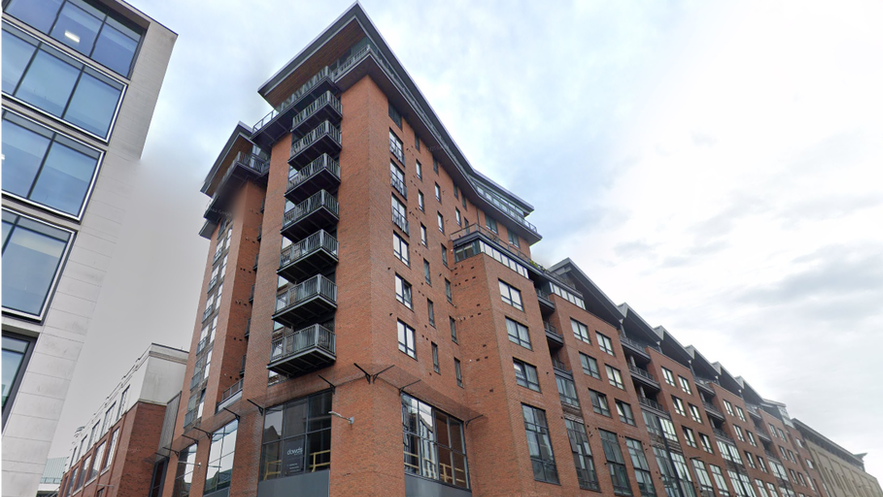Changes to legislation could leave architects 'at risk'

Ciarán Fox said under the new legislation architects could be held liable for faulty building materials instead of suppliers
- Published
An architectural organisation is calling for changes to be made to new legislation that aims to provide more protection for the owners of defective properties.
The Royal Society of Ulster Architects (RSUA) say the new law could result in innocent parties being held liable for the faults of others.
In 2019, owners of the Victoria Square apartments had to leave their city centre homes due to safety fears about the building's structure.
Their bid for compensation was struck out by the High Court in March.
They were told their case could not advance because, under the current law, claims must be made within six years of a building being completed.
In England and Wales, the timeframe is 30 years.
The companies involved in construction and fitting out of the apartments deny liability.
The legislation has been fast-tracked by the Communities Minister Gordon Lyons.
Ciarán Fox, director of RSUA, said he supports the executive's desire to act quickly but parts of the legislation could put architects at risk.
"While no-one has set out to make innocent people liable for the faults of others, this legislation blows that possibility wide open," he said.
"For example, an 85-year-old architect who has done nothing wrong could potentially be held liable for defective building materials in a housing project she designed when she was 55.
"This legislation would not hold the supplier of the faulty material liable."

Owners of the Victoria Square apartments had to leave their city centre homes due to safety fears about the building's structure
The Federation for Master Builders (FMB) has written to Mr Lyons asking him to review the plans.
"Our sympathies are with the home owners who are caught in the recent Victoria Square dispute," said FMB's director, Gavin McGuire.
"However with the fast tracked changes to the Defective Buildings Act currently moving at a pace through Stormont are a concern," he added.
''We feel that a period of consultation with industry, to work with the Minister and his team, should be an immediate action to try and avoid potential problems for both industry and clients down the line."
'An unknown risk'

Nicola Waddington said the legislation makes her practice unviable
Nicola Waddington, of Waddington McClure Architects in Donaghcloney, said she is concerned for the consequences of the new legislation "particularly smaller businesses in the construction industry".
"By introducing retrospective legislation for 30 years, that is an unknown risk. It is an unknown quantity that insurers cannot cost for" she added.
"It will mean that an architect retiring in their sixties will still be paying into their nineties."
She also said the new legislation is making their practice "unviable".
A Department for Communities spokesperson told BBC News NI that the minister and his executive colleagues believe that people in Northern Ireland should be afforded the same rights and privileges as those enjoyed elsewhere in the UK.
“This onus of liability on designers is not new, nor does this legislation seek to change that aspect of the law. This amendment to the Defective Premises Order does not change the premise of liability or how it may be applied, rather it simply extends that period for liability," the spokesperson said.
“While we appreciate the RSUA’s concerns, the evidence of claims taken over the last nearly 50 years suggests the likelihood of a claim arising against an architect or designer is low.
“This legislation will help ensure citizens in Northern Ireland are afforded the same protections as those in England and Wales under the Building Safety Act 2022.”
This article was updated on 17 June 2024 to include the response from the Department for Communities.